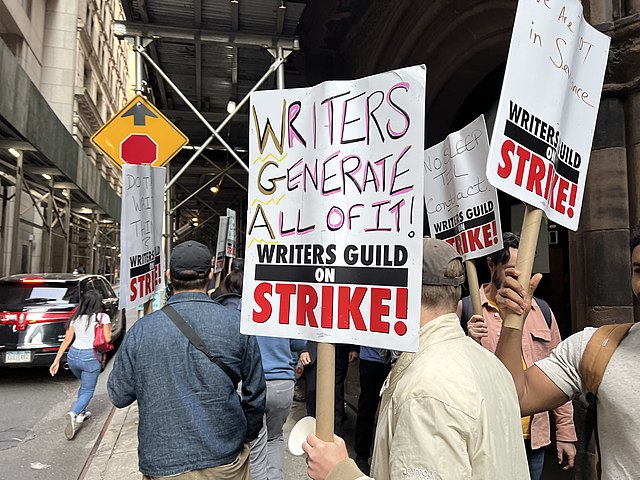Views expressed in opinion columns are the author’s own.
The writers know it, the actors know it and the executives are plotting it— artificial intelligence has the potential to completely change the entertainment industry.
Hollywood has gone silent. Previously, we received heavy promotion for films like Across the Spider-Verse, Oppenheimer and Barbie. Now, the minds behind these and other works are instead taking their voices to the streets in protest. For more than two months, the Writer’s Guild of America has been on strike with the goal of achieving increased minimum compensation, protections for writers and contracts that don’t let streaming services screw them over and instead compensate fairly.
But, as the actors guild joined the strike last week, there seems to be an additional point of contention — AI.
AI would be a bigger detriment to these professionals than the original complaints against streaming services. The average Netflix show nowadays is using a smaller writer’s room and producing fewer episodes spaced out between years, which is causing writers to be overworked and underpaid. These conditions are already horrible, but imagine if the writer’s room was replaced with AI. Human writers would completely lose the opportunity to work and display their talents.
We have seen the extent to what AI chat bots like ChatGPT can do for free. I could have a version of this column in a matter of seconds without paying anything. In the hands of greedy Hollywood executives who’d sacrifice quality for a quick buck, AI could easily become advanced enough to generate pitches and scripts for shows.
The actors aren’t safe either. Their likelinesses could be scanned and used for several projects all with the use of AI. This may sound far-fetched, but producers have already made mention of using AI scanning on background actors to capture their image for use in films.
As it stands now, AI is far from supporting members of the film industry. Actors and writers’ demands about the limits of AI in projects have gone unmet.
But there’s still hope. AI is not just potentially exploitative. Depending on who gets a say in how it is used, AI could be a great support to those that are currently feeling taken advantage of.
The director’s guild reached a tentative agreement last month with the Alliance of Motion Picture and Television Producers that all work under their responsibility must be fulfilled by a human — not AI. There will be no AI directed films coming out anytime soon. If the directors were able to protect themselves against AI, actors and writers can do so as well.
However, for actors and writers, protection from the negative impacts of AI will have to look different from what they are currently proposing and what the directors received. For the current guilds on strike, no AI is not the solution. Instead, they need AI on their terms.
AI can help actors complete mentally and physically demanding projects. With society’s love of twisted, horrific tales, there will likely be more serial killer, drug-using or psychotic characters on screen that an actor must prepare for. For some, this may mean mentally living this character for months.
I will admit I have little experience with acting, but if I had to pretend to be Ted Bundy chopping up a victim, I’d have some emotional problems afterwards. Scenes like these don’t need to be — and honestly shouldn’t be — filmed by the actors themselves. This is when it is most appropriate to use AI scans of the actors, so they can be saved from the potential mental scars of fully immersing themselves in the minds of characters like these.
When it comes to writing, I can understand not wanting anything to do with those word generating AI programs, but there is still a place for them. Rough ideas, outlines and even simple phrases can be generated with the use of AI. This frees up writers from the grunt work and allows them to focus on the parts they have the most expertise in. They’d be able to devote more time to fleshing out longer works with more impactful moments for viewers. Previously overworked and undercompensated writers would have help meeting new streaming timelines with the opportunity to earn more money from being able to create more episodes.
The recent trend of eight-episode seasons could finally be over with the use of AI. Put AI in the hands of writers and let them brainstorm enough content for a 22-episode season. Bring back lighthearted filler episodes!
AI is a great power that comes with great responsibility. We should put that responsibility in the hands of writers and actors. Hollywood executives need to sit down with both guilds and allow them to set their demands regarding AI use. New technology isn’t an enemy. It’s a tool for progress.
Lynelle Essilfie is a freshman public policy major. She can be reached at lessifi@terpmail.umd.edu.



